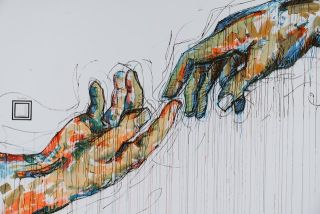OCD
What About OCD Caregivers?
Personal Perspective: Resources for caregivers are scant. So what can you do?
Posted March 4, 2023 Reviewed by Vanessa Lancaster
Key points
- Caregivers experience tremendous challenges that are shared with their partners.
- A study showed that people who have OCD often ask those around them for reassurance.
- Research suggests that responding to obsessive-compulsive cycles can be a significant degree of disruption to daily life.

A lot is written about those who live with obsessive compulsive disorder (OCD), but content for their caregivers is scant. A caregiver can be a person in a long-term, committed relationship who supports a partner diagnosed with OCD. When caregivers encounter obstacles regarding treatment, accommodation, or other daily challenges of living with someone with OCD, where can they turn?
Caregivers often face daunting issues, including a lack of resources, loneliness, and a lack of qualified therapists.
In this post, my wife (my caregiver) shares her key experiences from our book to offer an example, research findings, and tips for healing.
Example
Being a caregiver of someone with OCD isn’t easy and certainly isn’t for the faint of heart. It has taken many years of patience and understanding to live with OCD being so prevalent in our married life. For many years, I felt like a small boat being tossed in the middle of the sea during a hurricane, waiting to see if the next wave would be the one to come crashing down on everything, ending our relationship.
The truth is, you aren’t alone. Finding someone who understands what you’re going through or a support group whose members can put themselves in your shoes can be freeing. A few years back, I was introduced to a spouse whose partner suffered from the same obsessions as David. Talking to another person who understood took a burden off of me and allowed me to realize other caregivers were carrying similar burdens.
Being in a relationship with someone who has OCD is about always being prepared for anything. It’s about padding in extra time for compulsions while balancing them with the reality that we live on a time schedule. Ultimately, I have learned to anticipate what may come up on any given day and try to counterbalance it with something that will not act as a trigger or stimulus for David. I have also learned to resist the temptation to facilitate the obsessions and compulsions that are OCD. As we have continued our relationship, I feel more confident that I can confront the OCD head-on while working together with David as a united front so the obsessive-compulsive cycles aren’t so prevalent.
What the Research Says
OCD occupies time, energy, and trust in any relationship – particularly a marriage. Scholarly research indicates the result of responding to obsessive-compulsive cycles can be a significant degree of disruption of daily life:
[A survey] of family members of adults with OCD reported that 75 percent experienced disruption in their lives because of the OCD, including loss of personal relationships, loss of leisure time, and financial problems. Approximately 75 percent of OCD relatives participated at least minimally in rituals or avoidance or modified their behavior to accommodate patients’ symptoms (Steketee & Van Noppen, 2004).
In other words, caregivers experience tremendous challenges that are shared with their partners. They are never alone.
Fabrizio Didonna (2020), a professor at the Institute for Lifelong Learning of the University of Barcelona, identifies OCD as a trust disorder, in that people who have OCD cannot trust what they do, what their senses tell them, or what they remember. Following a triggering moment, people with OCD shift into autopilot and react by performing rituals to reduce their anxiety. Didonna (2020) explained that people who have OCD ask those around them for reassurance. Ironically, this reassurance received by others feeds and strengthens the obsessive problems and increases the person’s insecurity and distrust of themselves. As tough as it can be for a partner to ignore, reassurance offers temporary relief that continues to feed the obsession.
Tips for Healing
OCD is the third person in our marriage. I recognize that by marrying David, I married his OCD as well. When I compare Dave's two “parts,” I realize that his OCD inserts itself into our marriage like a major storm that comes out of nowhere during a midwestern summer. Strong marriages take constant work, and marriages with the addition of OCD make the work even more challenging and critical.
We have a name for David’s OCD that has become a part of our vocabulary: "Herb." We chose this name to lessen the emotional effects of OCD on our marriage by using humor. We mean no offense to anyone with that name; it’s just our chosen name. By personifying OCD, we are able to agree through our implicit trust in each other that Herb is not David. Herb is a part of David, and we have both agreed that Herb is not welcome in our relationship. A result of this agreement is a mutual goal to prevent Herb from taking over.
When it comes to surviving a serious disorder such as OCD, we use a lot of humor. This does not mean that we solely use humor. It's just one tool in our kit that helps us to lessen the effects of OCD in our marriage. Using humor helps us to keep in mind that OCD will not have power over us.
David’s OCD is separate from him and is not who he is. Naming the OCD assists me in telling David that Herb is “doing it.” I have found that by addressing the cycles this way, I am not attacking my partner as a person as much as I am reminding him that Herb has taken control at that moment. When traveling, we joke about leaving Herb back at home since he tends to be a bit of a killjoy. This way, when Dave starts “doing it” (obsessions or compulsions), I can gently remind him that we left Herb at home.
As difficult as it may be, it has been helpful in our marriage to confront obsessions and compulsions directly. It may seem simple to give in to obsessions and compulsions, but everyone loses when accommodating cycles. I have worked with David to be more sympathetic by learning about the different therapies and supporting him as he deals with his daily challenges. Educating ourselves about OCD has been a key part of combating the disorder.
To find a therapist, visit the Psychology Today Therapy Directory.
References
Culkin, D., & Culkin, M. (2021). OCD and Marriage: Pathways to Reshaping Your Lives Together. Specialty Press, Inc. This article is a modification of chapter 7. https://www.ocdandmarriage.com
Didonna, F. (2020). Mindfulness-based Cognitive Therapy for OCD: A Treatment Manual. The Guilford Press.
Steketee, G., & Van Noppen, B. (2004). Family approaches to treatment for Obsessive Compulsive Disorder. Journal of Family Psychotherapy, 14(4), 55-71.




